
Syria – the world’s training ground (+pl)
Opublikowano: 25 lutego 2016
(polska wersja – str. 2)
His excellence Dr. Idris Mayya, Chargé d`Affaires a.i. of the Embassy of the Syrian
Arab Republic in Warsaw, was interviewed by Konrad Michalski i Roman Mańka.
RM: How would you describe Polish-Syrian relations? What options do we have to improve them?
IM: There can be no doubt that Polish-Syrian relations are quite heavily influenced by historical factor. They have always been very good in various spheres of international cooperation. Hundreds of Syrian students have studied on Polish universities, and most of them have returned to Syria where they work at schools, they occupy high positions, while some have remained in Poland, established families, and have taken part in the evolution of Polish society. There are many Syrian entrepreneurs in Poland and they have actively contributed in the development of mutual economic relations, Though the current crisis has doubtlessly influenced these relations to a significant degree, visible in instances such as decreasing the scope of commercial trade. Ever since the crisis began, the Polish Ministry of Foreign Affairs remains in touch with the Syrian government. Polish diplomacy has always been a reasonable one. It has advocated dialogue between Syrians, all with the intention to lead them to a peaceful resolution. We hope that these relations will rejuvenate and will return to the level presented before the crisis engulfing our country. There has been a Syrian economic delegation in Poland recently, and we are currently preparing a mutual Polish delegation in Syria.
RM: You mentioned the crisis. What is the cause of it? Is it the worsening economic situation? Religious misunderstandings? Or maybe Syria is simply considered an experimental training ground for the great powers conducting their own geo-political businesses there?
IM: The crisis is caused by a combination of all those factors. It began in March 2011 through a chain number of demonstrations performed by the citizens in some places in Syria. The demonstrators made economic and political statements. The government deemed the nation’s demands acceptable and began their implementation. The decrees issued by the president on the political and economical side dealt with a new law regarding sharing political power, which allowed for the creation of political parties, excluding those founded on religious grounds. Others dealt with a new systems – electoral, information, public administration and, most importantly, preparing a new draft for the constitution, which was going to include a clause preventing the president from serving more than two terms. Sadly, since the very beginning we noticed that there were terrorists among the marchers. At the same time, Western countries, the US included, would keep pressuring the Syrian government even more, instead of being happy with the changes achieved peacefully. What is worse, some countries, both Arabic and non-Arabic, started to support the terrorist groups by sending them weapons, conducting training, and providing them millions of dollars. Such actions were mainly performed by Turkey, Saudi Arabia and Qatar. It is worth mentioning here that Turkey formed refugee camps at the Syrian border before even one Syrian left their country as a refugee. This is evidence of a pre-prepared scenario that had been established before any crisis situation arose. Further events only serve to reinforce this notion. We are currently observing how President Recep Tayyip Erdoğan is pressuring Europe, using Syrian refugees as bargaining chips. We have noticed that the influx of terrorists from radical Syrian groups is very high. They came from 83 countries around the world. It is hard to believe that thousands of people simply descended on Syria from above. They received help and formal facilitation to enter Turkey from other countries, which has allowed them to enter our country. I think the greatest challenge Syria’s government must face now is defending the interests of their own country. You can’t just assume that the Syrian government will just stand and watch everything unfold. Time and time again we have warned everyone that terrorism is very serious business and should be treated as such. It’s not an ace up one’s sleeve that is meant to be played when needed and discarded when it isn’t. It doesn’t work that way.
KM: In the context of this, what are the predictions regarding Syria resolving this conflict? What role played by the Syrian government should be fulfilled by other countries – the main geo-political players?
IM: Quite recently, the president Baszszar al-Asad gave an interview for a Czech television station. When asked about the end date for the crisis, he said it could end in a few months, should some Western countries cease to support Turkey, Saudi Arabia, and Qatar, which support terrorism in Syria. After this, we can start talking about political solutions. As long as there are terrorists in Syria, this is not possible.
KM: You mentioned preventing Western countries from influencing the conflict in Syria. How would you, in this context, comment on the role of Russia and the decision made by Vladimir Putin to take military action in Syria?
IM: First of all I would like to remind you that over a year ago the US has formed a coalition against ISIS, which includes over 60 countries. After a year of over 9000 air raids, has anything changed? ISIS has only become more widespread and territorial. There is also plenty of film footage available which documents coalition airplanes dropping military equipment for ISIS terrorists. The coalition created by the US was not created in compliance with the United Nations Security Council resolution. They refused to cooperate with Syria’s government and army. Russia began fighting ISIS around two months ago and in that short time there have been very positive results. By the way, the Russian intervention happened due to a lawful request from the Syrian government. Russians help from the air, while the Syrian army does so on land. Which is why we have achieved such good results fighting ISIS in so short a time.
RM: Are you saying that Western countries are actually supporting ISIS? If that is the case, why would they do that? ISIS is a threat to them as well, as seen by the recent attacks in France.
IM: First, let me ask you a question. Do you remember the situation in Afghanistan? Who created Osama bin Laden? Everyone knows that the US and Saudi Arabia supported the Taliban and Osama bin Laden, so that they could chase away the Russians in Afghanistan. This trump card, when put aside, turned against its player. The US Secretary of Defense, Ashton Carter, said that their country supports a moderate opposition of Syria. We have trained some of them, paid over 500 thousand dollars. From the trained people, only four remain. The others enlisted into Al. Nussram and ISIS. These are the words of the US Secretary of Defense. We say that terrorism is terrorism. There is no moderate and radical terrorism, Ever since the crisis began, people who have attempted to fight the government with arms, were called revolutionaries. However, when the attacks in Paris happened, they were called Jihadists and terrorists.
KM: In the context of that statement, how would you call Turkey shooting down a Russian bomber? An unhappy incident?
IM: We believe the Russian plane was purposefully destroyed. Russian aviation has destroyed over a thousand trucks containing oil that were approaching the part of Syria taken over by ISIL, to Turkey. It has been documented that the president’s son, Bilal Erdoğan, controls the purchase of oil to ISIS. Naturally, Turkey has ascertained that their interests are in jeopardy. At the G20 summit, President Putin said that ISIS is supported by more than 40 countries in the world. Among those countries are those who are taking part in the summit.
KM: Do you think that Turkey’s interests are limited to the purchase of oil?
IM: It should be noted that the Justice and Development Party are an Islamist party that wishes to return to the power of the Ottoman Empire, which is why it supported the Muslim Brotherhood in Tunisia when the events began there, and later it supported the Muslim Brotherhood in Egypt. We remember the friendly relations between Turkey and president Muhammad Mursim, and when the nation rose against the president and Abd al-Fattah as-Sisi was elected, the relationship between Egypt and Turkey deteriorated substantially. The president of Turkey also supports the changes happening in Libya. Some time ago, I read an article in one of the Western newspapers, that referred to Turkey as a ticking time bomb.
RM: There are several more big players in the Middle East. Aside from Turkey, there is Egypt, with whom Syria used to form the United Arab Republic, and Israel, which we haven’t talked about yet. Do you think they are fighting for leadership over the region?
IM: I think we all know the answer to this question. If we were to sum up the situation in the Middle East, it would turn out that the three strongest Arabian armies – Iraq, Syria and Egypt – have been weakened substantially, though it should be noted that the Iraqi army is practically non-existent, as the first think the Americans did after taking over Iraq was “scattering” that army. The Syrian army has been busy with in-fighting for five years, while the Egyptian army faces many problems in Sinai. In light of these events, there is one beneficiary in the Middle East. I remember one of the statements made by the representative of Israeli powers, which stated that Israel won’t be safe and cannot peacefully function if it doesn’t defeat or at least weaken the three aforementioned Arabian armies. This is what is currently happening in the Middle East.
RM: One more thing about Russia’s involvement. A lot has been said about involvement of the West, however, there are many voices, mostly American, that say Russians are not fighting the Islamic State, but president Assad’s government opposition. What do you make of such opinions?
IM: Before I answer the question, let me analyze it. What did the coalition, led by the US, do up until this point? Both Russia and Syria’s government asked the US government to present a list of names of people, who are considered moderate opposition. Such a list has not been presented yet. Americans know all too well that there is no such thing as a moderate, armed opposition in Syria. When you say opposition, you usually mean a political group. Has there ever been a country that has allowed armed opposition? What, then, is moderate opposition? The al-Nussram front? The Islamic Army? Sukur asz-Szam? All of these groups are radical, Islamist factions that are supported by Turkey, Saudi Arabia and Qatar.
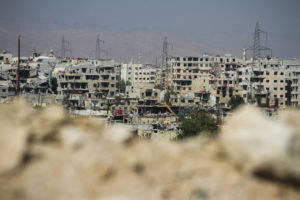
Syria, Damascus, September 2013. Damascus was destroyed as a result of prolonged fighting between the Syrian national army and rebels.
RM: How do you envision the EU’s role in the Syrian conflict? There have been declarations that the EU should accept refugees from specific countries.
IM: We would like Europe’s role to not be limited to accepting refugees. However, it is apparent that the actions taken by European countries are subjugated to the US line of politics. The EU has recently contributed 3 billion euro to help Turkey, in order to secure their borders from the influx of refugees. I hope that Europeans realize that it is in fact president Erdoğan who is behind the uncontrollable wave of refugees into Europe. We all hope Europe will pressure the president of Turkey. Besides, if any means are provided, they had better be used to close the borders through which terrorists are entering Syria. Then, Syria would be much safer and the refugees would come back to their homes.
RM: Hafiz al-Asad was the creator of the Republic of Syria. It was created as a socialist republic. There were 10 million people in Syria during his time. Are the problems of Syria caused by the social and socio-economic challenges are harder to best? Another question is, will Syria continue the socialist system?
IM: Syria has never been a socialist country, even during president Hafiz al-Asad’s term. The structure of the economy was based both on private and state property. We were never building a socialist system in the strict sense of the word. President Baszszar al-Asad introduced many economic changes after 2000, which helped Syria make a huge leap in that field. We became essentially self-sustainable when it comes to food, especially grain. Syrian medicine were exported to over 80 countries. Syrian clothes have become well known even in Europe. We provided energy to Lebanon and Iraq. The developmental leapt was especially noticeable in the infrastructure. In 2011, we didn’t have so much as a dollar’s worth of debt. However, it can’t be too comfortable for the US for there being a strong country in this region. Terrorist activities in Syria have also destroyed most industrial plants. Gas pipelines, oil pipelines, hospitals, universities, hospitals, medicine factories, and many, many others.
RM: What caused president Baszszar al-Asad to stay afloat? Egypt’s president Husni Mubarak has fallen during the Arab Spring, and then president Mursi faced the same fate, Kadafi fell in Libya, and so has the president of Tunisia. What factor decided that this president would maintain his position and nor give in to the Arab Spring?
IM: I would first like to ask if we can refer to those events as a spring. Spring has clear associations – it is green, it brings life. Coming back to the question, I think that no president in the world, even should he possess a huge army, perfect security service and external support, could not remain at his seat for five years when he has to fight against terrorists from over 80 countries around the world. President Baszszar al-Asad is supported by most of Syria’s society. Even public opinion polls run by the US show great support for the president. Which is why they are unwilling to perform an election with president Baszszar al-Asad and there has been constant pressure for the president to leave. We reply with a statement that anyone who wants our president to resign must resign first. The Syrian nation is the only sovereign of Syria, and no country, be it the US or Russia, can decide who will reign here.
RM: You are aware of Poland’s experiences with democracy. There was a round table meeting organized in ’89 for dialogue with the opposition. The situation in Syria is thus: the army is controlled by the president’s brother, Mr. Mahir al-Asad, and the governing party and army are dominated by the Alawi community. Would it not be better to follow in Poland’s footsteps and invite the opposition to share political power and the responsibility connected with it?
IM: That is not entirely true. The Arab Socialist Ba’ath Party is led by ten people. We don’t like to put it like this, but in this case I can tell you that there are only two Alawites in that 10-member group. The same goes for the government, while the Syrian army is very diverse in that regard. Most of those that died defending their country in this conflict are Sunni Muslims. The government posts are occupied justly. If what you said were true, the army would be unable to resist with such success in the recent five years. Everyone knows that the Syrian army is the only one that can successfully opposed the terrorists.
KM: From our interview and the events observed in the Middle East we can surmise that the instability in the region directly influences the instability in Europe. Do you think that there are any beneficiaries of the process of Europe’s destabilization?
IM: That question should be directed at the countries that still resist a political resolution of conflicts in the region. There are those who prevent joint conversations from taking place and reaching an understanding through dialogue. There are many Islamist organizations in Syria and they all have connections with different countries – Turkey, Saudi Arabia, Qatar, USA. International society should support Syrians and encourage dialogue between them. This is the only way to solve this problem.
RM: How serious can the Middle East be internationally? Can it lead to a serious, even world-wide, military conflict?
IM: For five years we have been combating the worst, most disgusting form of terrorism. We wouldn’t want to face what happened in other parts of the world. President Baszszat al-Asad was among a group of politicians who send their condolences to president Francois Hollande after the Paris attacks, even though the French government still supports some of the Syrian terrorist groups. Terrorism is a huge thread. If it spreads, it will no longer be a threat only to Syria and its surrounding region, but the entire world.
RM: Some say that the war on terror is World War III.
IM: President Asad always wanted the international society to create a single, joint strategy to fight terror. We cannot divide terrorism into medium, mild, radical… Those terrorists who arrived in Syria will one day return to their countries, which is where they’ll become a very real threat. We’ve seen what happened in Paris. Which is why we must not ignore this matter.
KM: What about the notion that the main threat now isn’t terror in the strict sense, but an intellectual terrorism, the thoughts and ideals that it carries?
IM: A very important question. We think that the biggest danger in the context of the future is that which influences a radical, backwards way of thinking. This is the way terrorist groups represent, alluding to the Wahhabi school of thought. Many religious centers supported by the Saudi Wahhabi present in many countries, both Arabic and European, take part in creating a new generation of fundamentalists and shape its worldview. We believe that we must fight centers that represent this intellectual and religious way of thinking. Terrirosm is not only a weapon in hand, but also the thought in your head, information, propaganda. It is a large threat to the entire peaceful world. One YouTube channel has a recording from Rakka which is currently under ISIS control. You can see a boy of 12 cutting off a man’s head. The adults sitting around are shouting “Allah is great”. What have they done to this child to make it capable of such a deed? There are many recordings like this. This is a huge threat.
RM: How has the Syrian government reacted to the change of government in Poland?
IM: That is Poland’s internal business. There was a democratic vote made by the society. Of course, we respect that choice, as we do with all choices made by the Polish nation. We have great respect for Poland’s experiences in the realm of democracy.
RM: Where would you say the positive relations between Poland and Syria stem from? Syrians think highly of Poles, and likewise, Poles like Syrians.
IM: I believe that most of the Polish nation realizes the truth behind the conflict in Syria. Terrorists have destroyed our whole life. While John Paul II visited Syria, he met with president Baszszar al-Asad and told him that Syria was the only country in the world where everyone lived together. They formed a family. In 2003, an American delegation visited Syria and Syria’s Mufti was asked about the number of Christians in Syria. The answer was 18 million. When asked about the number of Muslims, the answer was the same – 18 million. That is what Syria was and what it will be. Of course, all citizens will take part in it.
RM: Last question. Is it possible for Polish-Syrian relations to be friendly?
IM: We are hopeful for the future. Me, my coworkers at the embassy, Syria’s Minister for Foreign Affairs – we are all doing all we can to make our relations with Poland the best they can be.


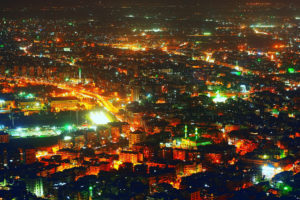
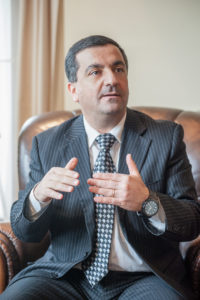
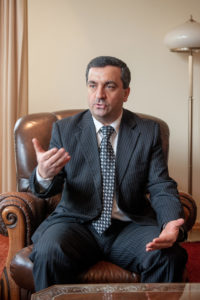
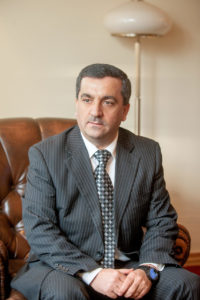
Dodaj komentarz